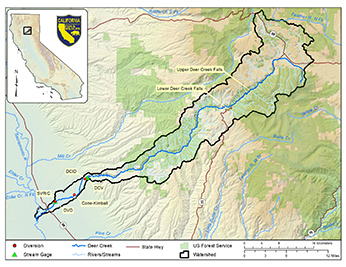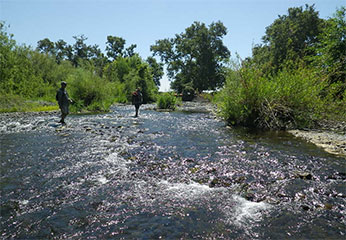 (click to enlarge)
(click to enlarge)
 Riffle in Deer Creek.
Riffle in Deer Creek.
Deer Creek is a Sacramento River tributary that supports a wild, genetically distinct population of Central Valley spring-run Chinook salmon, as well as fall-run Chinook salmon and steelhead trout. Deer Creek was identified as a high priority stream by CDFW for instream flow assessment. Natural and artificial passage barriers can prevent adult Chinook salmon and steelhead trout from reaching spawning habitat during low flows. In particular, spring-run Chinook salmon are threatened by low flow and elevated water temperatures in the lower watershed during their spring time migration period.
The IFP assessed natural passage barriers and temperature constraints in the lower section of Deer Creek. The primary objective is to understand the instream flow and temperature regimes needed for long-term protection and maintenance of adult and juvenile Chinook salmon and steelhead migration through the natural stream channel. Water temperatures were monitored and modeled using a Stream Network Temperature Model (SNTEMP). Passage conditions at depth sensitive, low gradient critical riffles were evaluated using species- and lifestage-specific depth criteria.
This study was completed in collaboration with U.S. Fish and Wildlife Service and CDFW Region 1 staff. The study results were used to develop a technical report and will be used to evaluate flow regimes fostering upstream migration of salmon and steelhead.
Resources